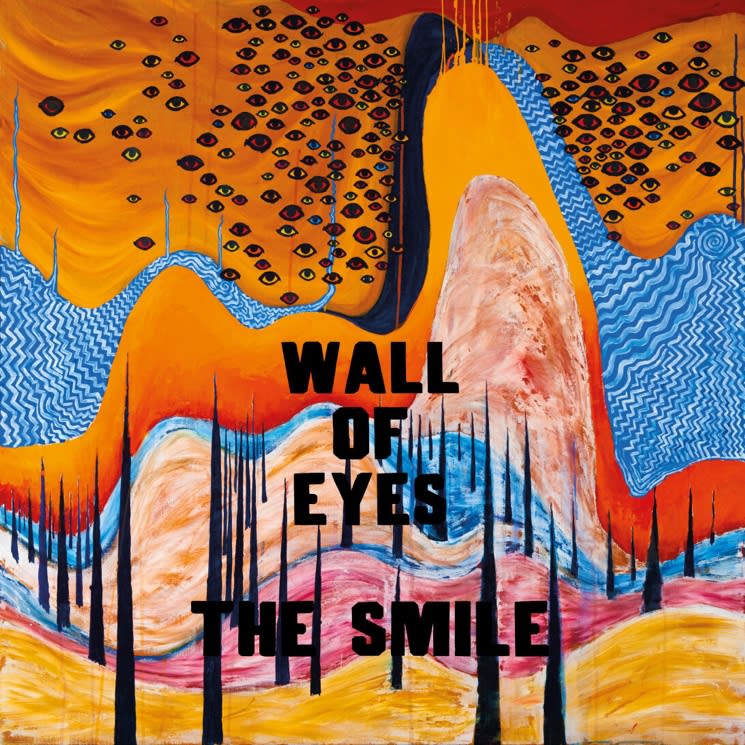At this point, it’s unfair to compare any band to Radiohead. They’ve achieved a dominance — both critically and commercially — that few bands from their era have managed to uphold, and every new release from the five-piece is treated with reverence and mystique, even when they’re at their most open, honest and vulnerable.
For the Smile, comparisons to this behemoth of a group are unfortunately inevitable: the band is composed of Thom Yorke and Jonny Greenwood (arguably the most recognizable names in Radiohead), plus percussionist/keyboardist/backing vocalist Tom Skinner. And yet the Smile is a different beast altogether, a noteworthy band in and of itself. This isn’t some cash-grab side-project, and the trio have returned to put any further comparisons to rest with Wall of Eyes, the follow-up to 2022’s A Light for Attracting Attention.
First single and album opener “Wall of Eyes” is a surprisingly bouncy, hectic way to start a sophomore album. Yorke practically coos through the track while piercing strings (courtesy, once again, of the London Contemporary Orchestra) hold on for dear life. Moments soar and dive in waves: one second it sounds like the sincerest love song you’ve ever heard; the next, you’re breaking up. Later, a buried chorus of voices counts from one to five; you don’t know if they’re signalling the end or the beginning, but it’s unsettling regardless.
“Teleharmonic” is a feat in skeletal arranging, with a hypnotic, oscillating drone drifting behind cracking rimshots and light cymbals as Yorke’s reverb-drenched voice oozes between the strikes, forming the flesh around Skinner’s percussive bones. The drifting, aptly named “Bending Hectic,” another Yorke song about a car crash, is heavily indebted to Greenwood’s film score work (particularly There Will Be Blood), while its sludgy, distorted finale acts as a much-needed wakeup call to the rest of the album.
Unfortunately, the crunchy, dynamic bombast of “Bending Hectic” comes too little, too late, which is Wall of Eyes’ biggest setback: while the album features its fair share of anxiety, particularly on the ever-evolving “Read the Room” and krautrock standout “Under Our Pillows,” it’s nonetheless missing the attitude that gave their debut its pressing, nervous — at times chaotic — energy. Skinner, who has roots in London's avant-garde jazz scene, feels noticeably under-utilized, the wistful drumming on Wall of Eyes betraying the complex, hard-hitting rhythms of both their debut and their boisterous, free-form live shows.
This lack of dynamism might have something to do with the extended runtimes of these songs: seven of the eight tracks are over five minutes long, and even “Friend of a Friend,” the album’s shortest song, meanders. This happens throughout Wall of Eyes: songs constantly morph and change, which, while interesting if done sporadically, makes for a lack of cohesion and tension.
Because the pace has noticeably slowed, the band negates its own penchant for jittery urgency, meaning that nothing comes close to the choppy punk perfection of “You Will Never Work in Television Again.” From its title (which conjures up images of skittering insects crashing frantically into a bulb), to its near-perfect blending of driving post-punk, funk, bubbling electronica and film score exuberance, A Light for Attracting Attention presented a necessary sense of turbulence that’s absent from Wall of Eyes.
Maybe it’s unfair to compare the two albums to such a degree: A Light for Attracting Attention was such an unexpected treat, a success story that’s sure to loom large over any subsequent era. Nevertheless, Wall of Eyes is an album of background music, a cinematic compilation that feels like a collection of songs that just weren’t good enough to be on its predecessor. It’s too jammy, too undercooked, too unedited — an overextended comedown without the requisite high.
